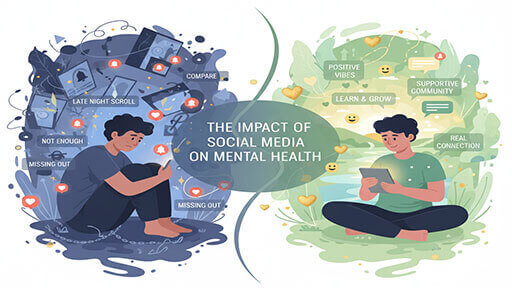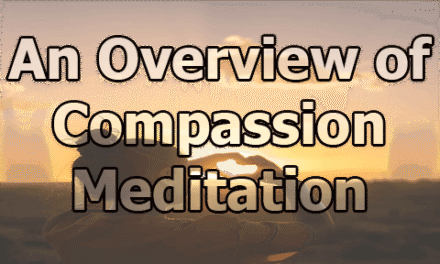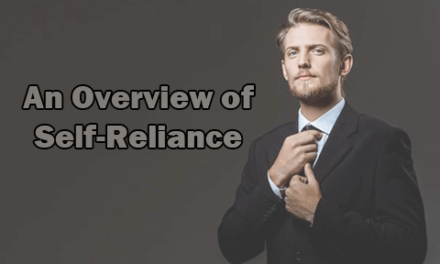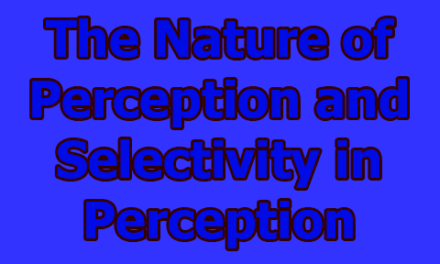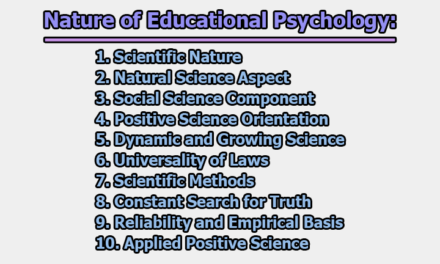The Impact of Social Media on Mental Health:
In today’s digital world, social media has become deeply woven into our everyday lives. We use it to stay connected with friends, learn new things, and express our creativity. However, the question arises — are we using social media to connect and create, or to compare and consume? Researchers found that “social media time is not very informative when studying the relationship with wellbeing, although it is still the most used measure” (Marciano et al., 2024, p. 13). This means that the amount of time we spend online may not tell the full story about how social media affects our mental health. Instead, how we use these platforms plays a much bigger role. Regularly curating our feeds—keeping what inspires us and removing what drains us—can help create a more positive experience. While social media often receives criticism for harming mental health, it also holds potential for connection, growth, and emotional support when used mindfully and with purpose. In the rest of this article, we will explore the impact of social media on mental health.
What’s the Connection Between Social Media and Mental Health?
The connection between social media and mental health is complex and depends largely on how we use these platforms. Social media can influence our emotions, relationships, and overall sense of well-being in both positive and negative ways. The type of content we consume, the tone of our interactions, and whether we actively participate or just scroll passively—all play an important role in shaping our experiences online. For instance, when people use social media to share uplifting content or support others, it can create feelings of belonging and positivity. However, constantly comparing ourselves to others or consuming negative content can lead to stress, anxiety, or low self-esteem.
Relationship status (It’s complicated): The link between social media and mental health isn’t as simple as labeling it “good” or “bad.” It’s more of a two-way relationship, meaning that our mental state can affect how we use social media, and in turn, how we use it can influence our mental state. Factors such as how often we use it, the reasons behind our use, and the quality of our online interactions all play a role (Mikami et al., 2025). For example, someone who uses social media to connect with friends or share creative work may experience positive emotions, while someone using it mainly to compare their life with others might feel more dissatisfied or lonely.
Quality, Rather than Quantity: Many people assume that spending a lot of time on social media automatically harms mental health—but that’s not necessarily true. What truly matters is the quality of our social media use. Using these platforms to build meaningful connections, learn new skills, or find motivation can improve emotional well-being. On the other hand, focusing too much on likes, followers, or online popularity can lead to feelings of inadequacy and stress (Marciano et al., 2024). By paying attention to how and why we use social media, we can create a healthier balance and make it a more supportive space for our mental health.
The Human Needs That Shape Our Mental Health:
Our mental health and wellbeing are deeply connected to three basic human needs: competence, autonomy, and relatedness (Ryan & Deci, 2000). These needs help us feel capable, independent, and connected to others — all of which play an important role in maintaining emotional balance and psychological growth. When we think about how social media affects our mental health, it’s helpful to reflect on whether our online habits are supporting or hurting these needs. By becoming more mindful of how we use social media, we can create experiences that truly nurture our wellbeing instead of draining it.
- Competence: The need for competence is about feeling capable, skilled, and confident in what we do. Social media can support this need when we use it to learn, grow, and develop new abilities. For instance, following educational pages, joining skill-based communities, or watching tutorials can make us feel more knowledgeable and motivated. To reflect on this, we might ask ourselves: “Am I learning something new when I log in? Do I leave feeling more capable or more overwhelmed?” When social media leaves us feeling inspired and informed rather than anxious or unworthy, it’s helping meet our need for competence.
- Autonomy: Autonomy refers to having control over our actions and choices. In the world of social media, autonomy means being intentional about what we consume and how we engage. We can protect our mental health by setting boundaries, curating our feeds, and deciding when to take breaks. This gives us a sense of power over our digital environment instead of letting algorithms control what we see or how we feel. A good question to ask is: “How much control am I exercising when I use social media?” When we feel that we can choose what to engage with, we’re more likely to experience positive emotions and less likely to feel overwhelmed or pressured.
- Relatedness: Relatedness is the need to feel connected, valued, and understood by others. Social media can fulfill this need when it encourages genuine human connections. Sharing personal stories, supporting friends, joining positive communities, or even sending kind messages can increase our sense of belonging and happiness. Reflecting on this, we might ask: “Did I feel connected to someone or to a group today? Was I inspired by a story? Did I share something meaningful to me?” When social media use helps us feel closer to others, it nurtures our emotional health and strengthens our overall sense of wellbeing.
In short, when social media supports our feelings of competence, autonomy, and relatedness, it can become a positive space that enhances mental health rather than harms it. By using these three needs as a guide, we can make more mindful choices and turn social media into a tool for personal growth and connection.
When Social Media Drains Mental Health:
Even though social media can offer benefits like connection and inspiration, it can also take a toll on our mental health if used in unhealthy ways. Sometimes, the very platforms that help us feel connected can also leave us feeling more anxious, lonely, or drained. When we use social media during times of stress or sadness, certain habits—like endless scrolling or constant comparison—can make those feelings worse. Over time, these patterns can weaken our ability to manage emotions and increase our stress levels (Chan et al., 2022).
- Mindless Scrolling: One of the biggest challenges of social media is mindless scrolling. Many social media platforms are designed to keep us engaged for as long as possible, using endless feeds, notifications, and recommendations. When we give in to the fear of missing out (FOMO), we may find ourselves constantly checking updates or messages without any real purpose. This habit can easily become harmful. Spending long hours scrolling through posts can interfere with sleep, lower productivity, and affect real-life relationships. Moreover, it can increase feelings of depression, anxiety, and self-criticism, leaving us mentally exhausted rather than refreshed (Chan et al., 2022). It’s important to recognize when social media is adding stress instead of comfort and take intentional breaks to reset.
- Comparison Spirals: Another major drain on mental health comes from comparison spirals. Most people share only the best parts of their lives online—the vacations, celebrations, and successes—while leaving out the ordinary or difficult moments. When we forget this, it becomes easy to compare our real lives to others’ highlight reels. Seeing others’ achievements or perfect photos can make us feel inadequate or left behind, even when we are doing fine ourselves. This constant comparison can slowly damage self-esteem, increase insecurity, and lead to negative self-talk (Marciano et al., 2024).
To protect our mental wellbeing, it’s helpful to remind ourselves that social media rarely shows the full picture. Practicing gratitude for our own lives, limiting comparison, and following accounts that uplift rather than discourage us can make a big difference. By becoming more aware of these draining habits, we can begin to use social media in ways that support rather than harm our mental health.
Practical Ways to Use Social Media for Better Mental Health:
Social media doesn’t have to be harmful to our mental health. When used with intention and awareness, it can actually become a tool for growth, connection, and emotional wellbeing. By making mindful choices about what we see, share, and engage with, we can transform social media from something that drains us into something that supports us. Intentional use can promote a sense of competence, autonomy, and relatedness—the same basic needs that shape overall wellbeing. Here are a few practical ways to build a healthier relationship with social media and make it work for, not against, our mental health.
- Curate for Good: The content we engage with shapes our mindset. Research shows that engaging with positive and meaningful content is linked to better mental wellbeing (Marciano et al., 2024). This means that curating our feeds carefully—choosing what to keep and what to let go—can have a big impact. For example, regularly reviewing your social media accounts can help you identify which pages, people, or groups make you feel inspired, supported, or happy. Unfollowing accounts that promote negativity, comparison, or unrealistic expectations is not rude—it’s self-care. Instead, focus on following people, organizations, or communities that align with your values, interests, and goals. When your feed reflects positivity and authenticity, logging in becomes an energizing rather than draining experience.
- Set Intentional Boundaries: Setting boundaries with social media helps us use it more consciously and reduces the chance of emotional burnout. According to Mikami et al. (2025), intentionally deciding how and when to engage can lead to healthier habits and better mental health. Before opening an app, try asking yourself simple questions: “Am I here to connect or to compare? To create or to consume? To learn or just to pass time?” These small moments of reflection help us understand our motivations and prevent us from falling into mindless scrolling. Establishing time limits, taking digital breaks, or setting “no-phone zones” can also help restore balance. Boundaries are not restrictions—they are ways of protecting our focus, energy, and peace of mind.
- Share Positivity: Social media becomes truly powerful when it’s used to spread positivity. Sharing uplifting messages, gratitude posts, or encouraging stories can boost not only our own mood but also the wellbeing of others. Positive sharing helps strengthen connections, build resilience, and create a ripple effect of optimism (Marciano et al., 2024). Imagine a social feed filled with kindness, thoughtful reflections, and inspiring images—it can serve as a digital environment that supports hope and emotional strength. Expressing gratitude, even in small ways, such as thanking someone publicly or posting about what went well in your day, can uplift your mindset and inspire others to do the same.
In essence, using social media with care and purpose allows it to enhance, rather than harm, our mental health. By curating positive content, setting clear boundaries, and sharing encouragement, we can turn our digital spaces into places of growth, connection, and joy.
At the end of the day, the impact of social media on mental health depends largely on how we choose to use it. It’s not the platforms themselves that determine whether our experience is positive or negative—it’s our habits, intentions, and awareness that truly matter. While stepping away from social media completely might lower feelings of stress, depression, or anxiety, it can also cut us off from valuable opportunities to connect, learn, and grow. Instead of avoiding it, we can focus on using social media mindfully and with purpose. By choosing connection over comparison, autonomy over addiction, and genuine experiences over social status, we can turn social media into a supportive space for our well-being. When used thoughtfully, social media has the potential to strengthen mental health and help us build more meaningful, balanced, and fulfilling online lives.
Frequently Asked Questions (FAQs):
How do I know if social media is helping or hurting my mental health?
Pay attention to how you feel after using social media. If you feel inspired, connected, or calm, it’s likely helping you. But if you feel anxious, drained, or compare yourself to others, it might be affecting your mental health negatively.
Does everyone experience social media the same way?
No, everyone’s experience is different. Factors like age, personality, emotional state, and the way each person uses social media can greatly influence how it impacts mental health.
How can I make my social media experience more positive?
Try curating your feed by following uplifting and meaningful accounts, unfollowing toxic ones, and setting clear boundaries for your screen time. Engage in ways that support your growth and wellbeing.
Is taking a break from social media good for mental health?
Yes, taking a digital break can help you reset your emotions, reduce stress, and regain focus. Even short breaks—like one day a week—can improve mood and mental clarity.
Can social media actually improve mental health?
When used intentionally, yes. It can help people build supportive communities, share experiences, find inspiration, and access mental health resources—all of which can boost wellbeing.
Why do I feel lonely even when I’m active on social media?
Online interactions can’t always replace real human connection. If social media use becomes more about scrolling than engaging meaningfully, it can increase feelings of isolation.
What are signs that I need to change my social media habits?
If you notice constant comparison, sleep problems, reduced productivity, or frequent negative emotions after scrolling, it may be time to re-evaluate how and why you use social media.
How can I set healthy boundaries with social media?
Decide when and how long you’ll use it each day, turn off unnecessary notifications, and avoid checking your phone first thing in the morning or before bed.
Are young people more affected by social media than adults?
Younger users may be more vulnerable to the pressures of social comparison, but adults can also experience anxiety and stress from online interactions. Awareness and education are key for all age groups.
Can mindfulness really help with social media use?
Absolutely, practicing mindfulness helps you become aware of your thoughts and emotions while using social media, allowing you to make conscious choices instead of reacting automatically.
References:
- Chan, S. S., Van Solt, M., Cruz, R. E., Philp, M., Bahl, S., Serin, N., Amaral, N. B., Schindler, R., Bartosiak, A., Kumar, S., & Canbulut, M. (2022). Social media and mindfulness: From the fear of missing out (FOMO) to the joy of missing out (JOMO). The Journal of Consumer Affairs, 56(3), 1312–1331. https://doi.org/10.1111/joca.12476
- Marciano, L., Lin, J., Sato, T., Saboor, S., & Viswanath, K. (2024). Does social media use make us happy? A meta-analysis on social media and positive well-being outcomes. SSM – Mental Health, 6, 100331. https://doi.org/10.1016/j.ssmmh.2024.100331
- Mikami, A. Y., Khalis, A., & Karasavva, V. (2025). Logging out or leaning in? Social media strategies for enhancing well-being. Journal of Experimental Psychology: General, 154(1), 171–189. https://doi.org/10.1037/xge0001668
- Ryan, R. M., & Deci, E. L. (2000). Self-determination theory and the facilitation of intrinsic motivation, social development, and well-being. American Psychologist, 55(1), 68–78. https://doi.org/10.1037/0003-066X.55.1.68

Library Lecturer at Nurul Amin Degree College

